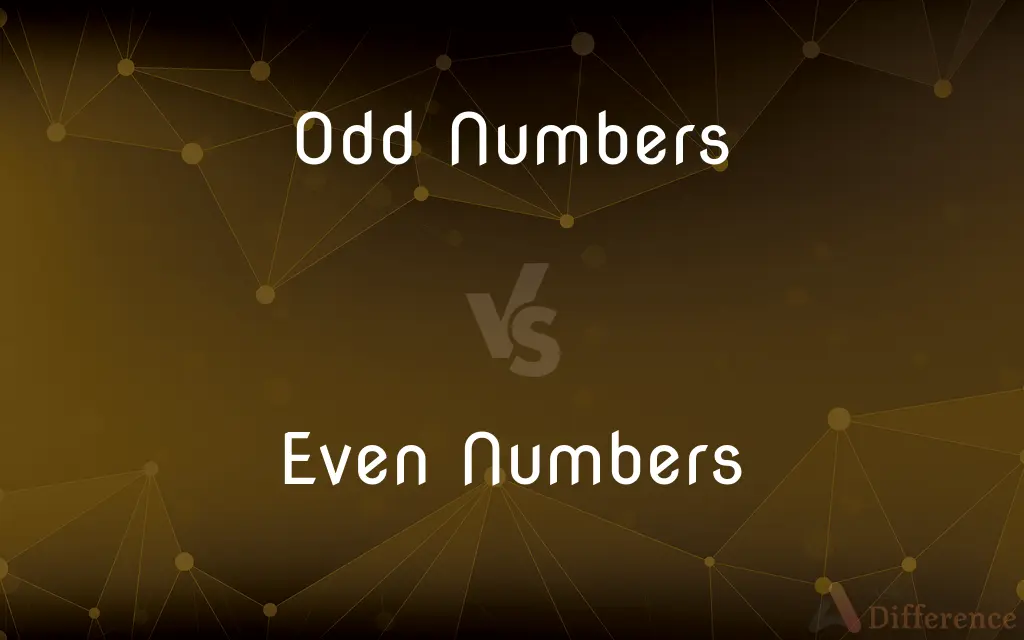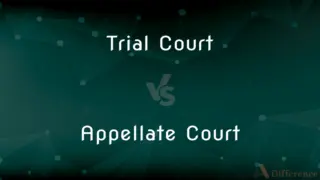Odd Numbers vs. Even Numbers — What's the Difference?
Edited by Tayyaba Rehman — By Fiza Rafique — Published on January 2, 2024
Odd numbers are integers not divisible by 2, while even numbers are integers that are divisible by 2.

Difference Between Odd Numbers and Even Numbers
Table of Contents
ADVERTISEMENT
Key Differences
Odd numbers are integers that have a remainder of 1 when divided by 2. They are not evenly divisible by 2, which is the defining trait of odd numbers. Examples of odd numbers include -3, 1, 7, and 15. In any sequence of consecutive integers, odd and even numbers alternate; for example, after an even number, the next integer is an odd number.
Even numbers are integers that are exactly divisible by 2 without any remainder. These numbers always end with a digit of 0, 2, 4, 6, or 8. For example, numbers such as 2, 14, 26, and 88 are even. In mathematical operations, even numbers exhibit properties such as being able to be halved into another integer and being the sum of two integers.
The differences between odd and even numbers are fundamental to the study of mathematics, particularly in number theory, where the properties of odd and even numbers are further explored. While both odd and even numbers can be prime (except for the number 2, which is the only even prime number), even numbers are more commonly associated with multiples and factors.
Comparison Chart
Divisibility by 2
Not divisible by 2.
Divisible by 2 without a remainder.
End Digits
End in 1, 3, 5, 7, or 9.
End in 0, 2, 4, 6, or 8.
ADVERTISEMENT
Sum Property
Sum of two odd numbers is even.
Sum of two even numbers is even.
Multiplication Property
Product of two odd numbers is odd.
Product of two even numbers is even.
Compare with Definitions
Odd Numbers
Each odd number has a remainder of one when divided by two.
When dividing five by two, the remainder is one, making it an odd number.
Even Numbers
An even number has no remainder when divided by two.
Eight divided by two is four, with no remainder, which means eight is even.
Odd Numbers
Odd numbers are sequential integers between even numbers.
Seven is an odd number that comes after six and before eight.
Even Numbers
Even numbers alternate with odd numbers in the integer sequence.
Ten is an even number, followed by the odd number eleven.
Odd Numbers
Odd numbers are integers that cannot be evenly divided by two.
Three is an odd number, as it cannot be divided into two equal whole numbers.
Even Numbers
Even numbers are integers that can be evenly divided by two.
Four is an even number, as it can be divided into two parts of two.
Odd Numbers
An odd number is always one more or one less than an even number.
Nineteen is an odd number, sitting just one unit above eighteen.
Even Numbers
The sum or difference of two even numbers is also even.
Adding twenty-two and six, both even numbers, results in twenty-eight, which is even.
Odd Numbers
Odd numbers have the last digit as 1, 3, 5, 7, or 9.
The number 21 is odd because it ends in one.
Even Numbers
Even numbers end in 0, 2, 4, 6, or 8.
The number 32 is even because its last digit is two.
Common Curiosities
Can odd numbers become even?
When multiplied or added to an even number, odd numbers can yield an even result.
What are odd numbers?
Odd numbers are integers not divisible by 2.
Do odd numbers have factors?
Yes, odd numbers have factors, but they are all odd themselves.
Can two odd numbers sum up to an odd number?
No, the sum of two odd numbers is always even.
What are even numbers?
Even numbers are integers divisible by 2 with no remainder.
Is the number 1 considered odd or even?
The number 1 is considered odd.
Are zero and negative integers included in even numbers?
Yes, zero and negative integers can be even if they are divisible by 2.
What happens if you subtract an even number from an odd number?
Subtracting an even number from an odd number always gives an odd result.
Can even numbers be negative?
Yes, even numbers can be negative if they are divisible by 2.
What is the smallest even number?
The smallest positive even number is 2.
How do you identify an even number?
An even number ends with 0, 2, 4, 6, or 8.
Are all prime numbers odd?
All prime numbers are odd except for the number 2, which is even.
Why are even and odd numbers important?
They are fundamental concepts in arithmetic, number theory, and help in classifying integers and their properties.
Do even numbers have more factors than odd numbers?
It depends on the number, but even numbers often have more factors due to divisibility by 2.
How do you identify an odd number?
An odd number ends with 1, 3, 5, 7, or 9.
Share Your Discovery

Previous Comparison
Olive Oil vs. Vegetable Oil
Next Comparison
Static in Java vs. Final in JavaAuthor Spotlight
Written by
Fiza RafiqueFiza Rafique is a skilled content writer at AskDifference.com, where she meticulously refines and enhances written pieces. Drawing from her vast editorial expertise, Fiza ensures clarity, accuracy, and precision in every article. Passionate about language, she continually seeks to elevate the quality of content for readers worldwide.
Edited by
Tayyaba RehmanTayyaba Rehman is a distinguished writer, currently serving as a primary contributor to askdifference.com. As a researcher in semantics and etymology, Tayyaba's passion for the complexity of languages and their distinctions has found a perfect home on the platform. Tayyaba delves into the intricacies of language, distinguishing between commonly confused words and phrases, thereby providing clarity for readers worldwide.
















































